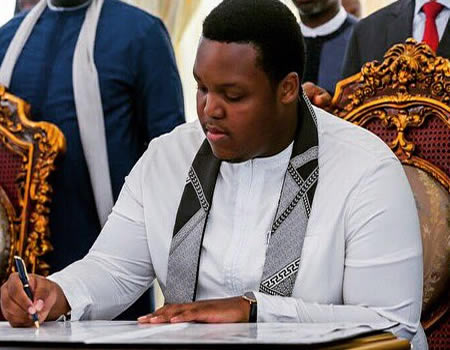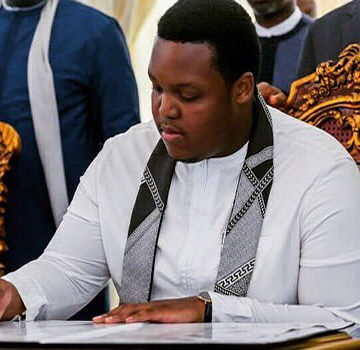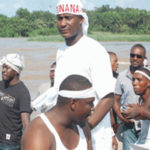The programme, founded by Aham Rochas, son of Imo state governor, Rochas Okorocha, is an intensive six months programme for IDP children in various camps across the FCT, who as a result of insurgency and other social vices have been forced out of school for a period of two years or more.
Rochas, who at the weekend spoke with journalists during a visit to the Karmajiji IDP camp, Abuja said the pilot programme which started in September will be transitional as students who are at secondary school level would be absolved in other conventional schools with supports from the foundation.
While stressing the importance of education to economic development, he stated that the programme will be replicated in other camps in the territory.
“I currently run a couple of companies, we do ICT, PR and basically I have done this at a much younger time. I feel that I will not be where I am today without education and it is In my view that it is one thing that does not discriminate. If you have education, all of a sudden opportunities are available to you use but without that you don’t have the ability. We felt it was necessary to start with the Primary Education to secondary level because foundation is everything , I can trace back my successes to my primary foundation.
“The interest in IDPs is simple, I lived in Jos so I have connects with people in that part of the country but beyond that, the EEP is going to get much bigger the foundation is being funded by our group of companies but we hope that in the next two to three years we would branch out to other places. This is our pilot programme. The EEP looks at places that are in distress, places that there is war,disasters or tragedy, about three months ago we had considered going to Benue but it able to make it.
“ In cases where all of a sudden the education of a child is put on hold and that is something we shouldn’t let happen, a child’s education should not be put on hold in any situation because when your education is put on hold somehow your life is also put on pause and so that is why we are doing IDPs and that is why we are working to make it repeatable. The IDPs are peculiar because you can imagine a child at seven years old but who had never gone through school or gone to school for two years
“We had considered different locations close to Abuja and that their stories were peculiar you can imagine a child of seven to eight years old but had never gone to school for two years and for every year that a child misses that is a huge part of his life. So we decided to do our pilot programme there. First of all the Aro foundation is closely related to our sister foundation the Rochas foundation, they do primary schools but that is in very few places but majority of what they carry out is secondary schools and free education and so that is why we are looking at primary schools. It is not our aim that after six months we would leave the children, we would love to stay as long as possible but there is constraint because we had analysis and we said in six months we cancel, if it is six months of an intensive programme, how much can we help people to achieve results so we can be able to go elsewhere.
“ I am more hopeful about the future even after the six months programme ends , because the children i have seen , they are kids that are extremely determined to learn, they are not forced to come. After the six months programme, our plan is to truly towards the last two months the ones who are at the secondary school level, we try to put them in certain schools it is a transitional thing and even the primary schools we are trying to look at schools nearby that are really good and then push them in and maybe do something like a bulk payment for the number of students so we are not just leaving them, even with what i have seen in the last three months i am very impressed with what i have seen,”he explained.
He noted that although majority of children under the programme are from regions where the Almajiri system and early marriage is encouraged, measures have been put in place to change their orientations.
“Rochas foundation a vision which i keyed into a long time ago basically believes that every single child should be in school and i think the five or six schools currently spread across the country, Jos, Ibadan, Owerri, Imo State, , there also new secondary schools coming up in Zaria and Yobe i think that that does more in cutting down in the number of out of school children but i think that it is something that in the nearest future the Federal government and state government should look at . we are in a society that we are not prosperous but to get to that point i think we do need education where every child will be educated.
“The benefits might not come now but it has to be a sacrifice made by everybody, it will not come in the next one year but in the next 20 to 30 years that is when we would start seeing the benefits. So but in our small way with the Aro foundation , one of our long time goals is to join the Rochas foundation and open free primary schools. It is our hope that we get to cut down the numbered, it is a lot of people that are out of school,” he added.
Earlier, the Head of programme, Miss Lemmy Bonnet explained that the programme is aimed at equipping the children with the basic knowledge, needed to fit into the conventional schools.
According to her, majority of them, between ages 2 to 19 years are from the Northern parts of the country where the Boko Haram terrorists had ravaged their communities.
“We started registrations around August it was a bit challenging from the beginning because they were not exposed but through it all we were able to register the students at the beginning we were able to register 170 students but i can not say we are up to that now. We have children age 9 years in Nursery because they know nothing.
“They are all Northern children majorly IDPs. We did not get to force them or convince them. They were excited because they had started something for them before now but had left. Some of them had been here for four years since the Boko Haram thing started so to to an extent they have an idea of the importance of school. So we didn’t have to do much to get them to come to school. At the end of this programme, we hope to have them fit into basic or normal schools and be able to cope with other students,” she said.







